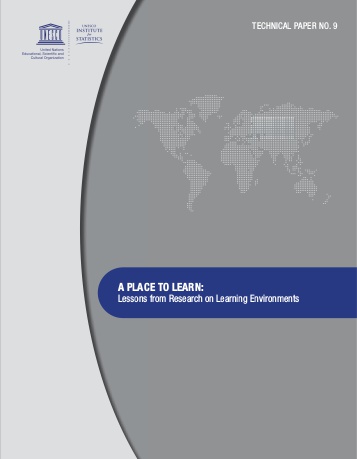A place to learn : lessons from research on learning environments
Abstract
This report was originally drafted as part of an activity undertaken by the UNESCO Institute for Statistics for the purpose of informing the international education community on new pathways for assessing and improving the quality of learning environments. More specifically, the terms of reference for this study called for i) an overview of existing research on the conditions of learning from the major perspectives; and ii) identification of the links and common ground among those perspectives.
In its final version, ‘A Place to Learn’ presents a comprehensive review of research on learning environments from multiple perspectives, broadly grouped as those that focus on the physical conditions, psychosocial environment and/or organizational climate of classrooms, schools and other learning spaces. Beginning with a sampling of the wide spectrum of paradigms currently used to approach these dimensions, the review purposefully steps back to consider their common theoretical roots. In-depth descriptions of selected state-of-the-art research methods and tools are then provided along with numerous examples of their application in different parts of the world. The general conclusions and recommendations offered in light of the collected findings are intended to
assist learning communities, particularly those in countries with limited resources, with a practical framework for creating and sustaining safe, healthy, equitable and inclusive environments that foster effective learning. The selection of background sources and recent research on learning environments was guided by a simple question: How can schools and other learning places create optimal conditions for learning?.
The preliminary search covered both primary and secondary sources on the theoretical underpinnings of current research paradigms and identification of studies representing the major approaches. In the end, from the over 300 sources reviewed during the preliminary search, 91 background references and 58 studies were selected from such diverse disciplines as educational philosophy, cognitive psychology, evolutionary biology and architecture. The majority of the case studies illustrating the use of methods and tools for assessing and improving learning conditions are grounded in the rapidly evolving field of learning environments research (LER). In addition, large-scale studies involving elements of isolated elements of learning environments as well as insights from ideological, ethnographic and indigenous research are also included in the review. Although the bulk of the sources cited and examples identified for close examination were drawn from the literature available in English, a number of studies available exclusively in French, Spanish, and Portuguese were also included in the review. Priority was given to published studies carried out in non-Western contexts, where available.
As a means of organizing and consolidating the vast array of evidence gathered from these collected sources, the report is structured around three interrelated lines of inquiry:
•• What are the major theoretical roots that have given rise to current approaches to the study of learning environments?
•• How are ‘learning environments’ and ‘enabling conditions for learning’ understood and
assessed within the international framework of quality education for all?
•• How can the quality of learning environments be measured and improved?
In response, ‘A Place to Learn’ reaches the following general conclusions:
•• Assumptions and beliefs about the nature and impact of learning environments are as old as human civilization. The written historical record yields a rich variety of perspectives which, considered collectively as the antecedents to scientifically based theoretical insights, form a strong foundation for current approaches to the study of learning conditions.
•• The essential features of learning environments perceived as essential to reaching the goal of quality education for all are well defined within the EFA literature. However, robust strategies for assessing and improving them at national and local levels are rarely found outside of the developed world.
•• Researchers from a wide variety of academic disciplines have contributed to a rapidly
expanding pool of expertise, including well-crafted methods and tools, on how learning
environments can be measured and improved. However, the application of these in countries with limited resources and weak learning achievement records has been painfully slow.
In view of the compiled findings, this report urges policy-makers, researchers, architects, interior designers, teachers, parents, learners and community members to combine their expertise to create and sustain conditions that assure every learner’s right to a quality education. Finally, ten recommendations are proposed for consideration by everyone concerned assessing and improving learning environments, but especially by stakeholders in parts of the world where the most basic requirements for safe, healthy, equitable and inclusive conditions of learning are not currently being met.

